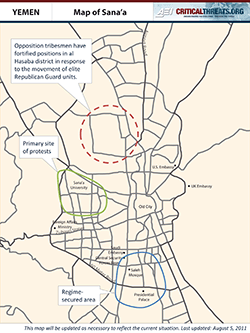 |
The reopening of transition talks in Yemen and the focus on how to end the political crisis in the capital ignores the fragmentation of the Yemeni state. Al Qaeda-linked militants have contested the authority of local power structures in Abyan governorate and armed tribesmen are resisting a Yemeni military presence in Taiz.
The offensive against al Qaeda-linked militants in Zinjibar continues. Yemeni army shelling killed four suspected al Qaeda militants in al Khamila and Bajdar, outside of Zinjibar. Local sources report that fifteen al Qaeda militants were arrested in Lawder in Abyan governorate.
President Ali Abdullah Saleh agreed to restart negotiations with Yemeni and international parties to find a solution to the current political crisis. Saleh has demanded that the transition plan lay out the “mechanism of implementation” for the transition. Yahya Saleh, the commander of the Central Security Forces and Saleh’s nephew, said, “There is no solution other than dialogue to put an end to this crisis.” Yahya Saleh added, however, that anyone who resorts to force will be dealt with. Hundreds of thousands of Yemenis turned out across the country to demonstrate against Saleh’s regime.
The ceasefire in Taiz has already collapsed. Yemen’s state news agency reported that one soldier was killed in clashes and two others were wounded.
A resolution to the political crisis in the capital will not end the fragmentation of the Yemeni state, which remains at risk of a broader armed conflict. The current situation has increased al Qaeda's operating space in Yemen.
